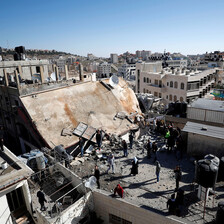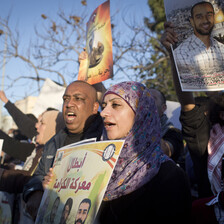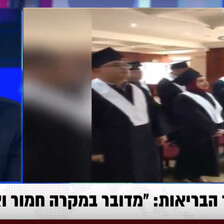The Electronic Intifada 6 July 2015
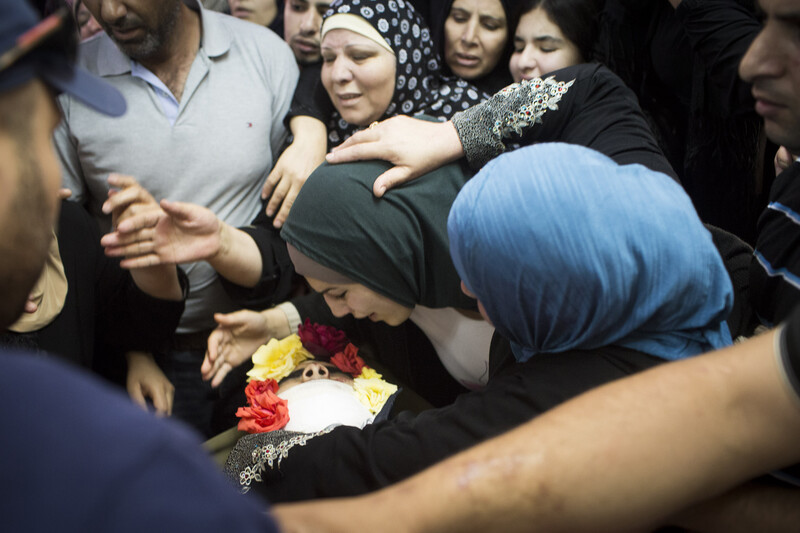
Family mourn during the funeral of Muhammad al-Kasbeh, shot dead by an Israeli commander in Qalandiya refugee camp, 3 July.
ActiveStillsA large picture of Yasser and Samer al-Kasbeh covers the wall of the living room at their family’s home in Qalandiya refugee camp, between Jerusalem and Ramallah in the occupied West Bank.
Yasser was just 11 years old when he was killed by Israeli occupation forces on 16 December 2001, and Samer was just 15 when he was killed — fewer than 40 days later — on 25 January 2002.
That was at the peak of the second intifada and Muhammad al-Kasbeh, their youngest brother, was just 3 years old at the time.
The loss of his brothers would profoundly shape Muhammad’s life and permanently haunt his parents.
Being the youngest boy among five sons and two daughters, Muhammad was especially spoiled by his parents. And the care was accompanied with constant apprehension and caution.
Noting his son’s involvement in protests against the Israeli occupation from an early age, Muhammad’s father Sami, better known as Abu Thaer, opted to take him out of school at the age of 16. Abu Thaer works at a school canteen where his son regularly helped him.
That decision came after Muhammad had been injured twice during protests in July 2014.
“I appealed to him not to go to protests or to participate in clashes, not because I don’t support resistance, but because we’ve already endured the loss of two sons and couldn’t handle another,” Muhammad’s father told The Electronic Intifada.
Not even the watchful eyes of a protective family, though, could have saved Muhammad when the bullet of Yisrael Shomer, commander of Israel’s Binyamin Brigade, ended his life last Friday.
“Nothing to hide”
Accounts of Muhammad al-Kasbeh’s death vary, with initial reports published by Ma’an News Agency and other local Palestinian media claiming that he was shot dead while trying to climb the Israeli wall in al-Ram, a village just east of occupied Jerusalem.
But the boy’s family, neighbors and residents in the camp assert that he was killed during clashes at the al-Ram-Qalandiya junction.
“We have nothing to conceal,” said Houriyeh, a woman elder and a close friend and neighbor of the al-Kasbeh family.
“Muhammad was killed after he threw a rock at the jeep of high-ranking Israeli officers; the rock broke the jeep’s window, prompting the officer to get out of the car and fire at him from close range, and then pose with his gun in glee. What Muhammad did was heroic and we should not be shy or ashamed of saying that our son died while resisting the occupation,” she added.
The Israeli and mainstream western media’s tendency to vilify Palestinian youths who throw stones, coupled with the obsession with nonviolent resistance, has led even some Palestinians to avoid talking about throwing stones or Molotov cocktails, and sometimes to deny that it happens.
Even though Palestinians have every right to resist a military occupation that denies them their freedom and strips them of their land, there is a perception that reporting about it somehow delegitimizes the Palestinian cause, justifies the Israeli killings and erodes international sympathy with the Palestinians.
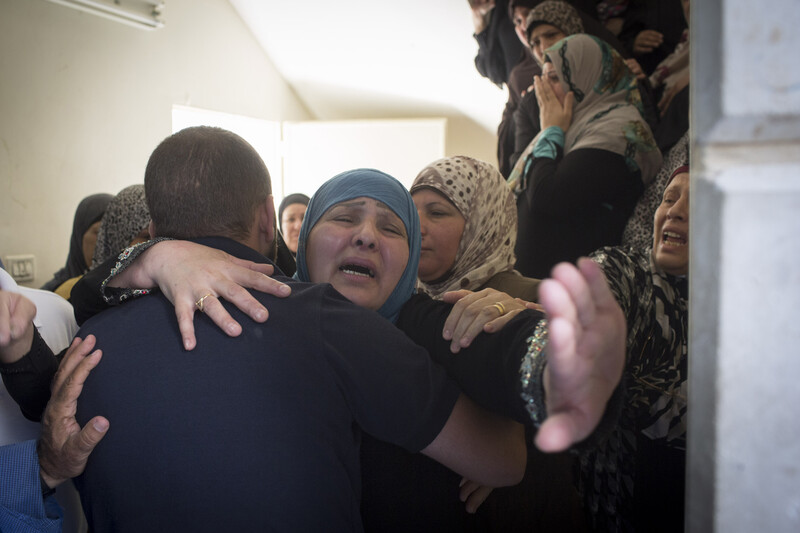
Muhammad al-Kasbeh’s mother, Fatima, mourns during her 17-year-old son’s funeral on 3 July.
ActiveStillsBut there was no such concern from the al-Kasbeh family.
The reality for Palestinian youths is that there is no avoiding the occupation: it confronts them every waking moment, and often during the night as they sleep in their beds. Its relentless and pervasive violence constricts and stifles every aspect of their lives.
Family members also lamented the inaccuracies in some Palestinian reports and questioned the reasons behind them. “This feels like an attempt to scare the youth from climbing the wall to get to Jerusalem,” said one of the neighbors sitting next to al-Kasbeh’s mother.
A statement issued by the Jerusalem branch of the political faction Fatah, for instance, repeats the same claim, that al-Kasbeh was killed while scaling the wall.
“Dream come true”
Fatima, Muhammad’s mother, told The Electronic Intifada that Muhammad had indeed climbed the wall on the second Friday of the present fasting month of Ramadan, exactly a week before his killing.
“It was the first time he entered Jerusalem in eight years,” she said. “Praying in al-Aqsa mosque and seeing Jerusalem was a dream come true for him.”
Sami al-Kasbeh said that the family had applied for a permit from occupation authorities but it was rejected, which led Muhammad to take the more dangerous path to Jerusalem of climbing the wall.
“He didn’t tell me that he was intending to go to Jerusalem because he knew I wouldn’t let him do it and the day he was killed I didn’t know if he was going to try to repeat it,” Abu Thaer said.
“I wish I had died before he left the home. I wish I had died before Hammoudeh [Muhammad’s nickname] had left me,” said Fatima, who is one of three Palestinian women in Qalandiya refugee camp to lose at least two of her sons at the hands of Israel.
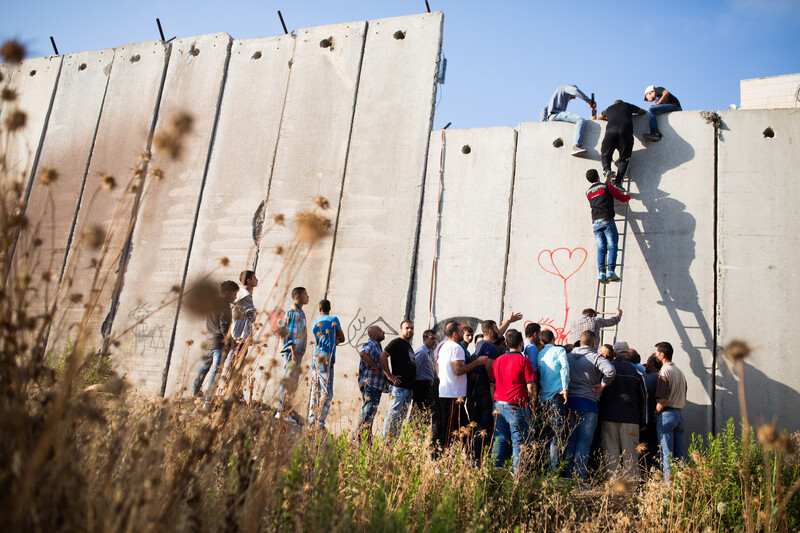
Palestinians climb Israel’s wall in the village of al-Ram to attend Friday prayer at al-Aqsa mosque in Jerusalem, 3 July.
ActiveStillsThe road from Qalandiya to Jerusalem should be open to Palestinians; it is not supposed to be mined with checkpoints, walls and death. But this is the reality as Israel has isolated Palestinians in the rest of the West Bank from their city of Jerusalem.
Israeli occupation forces have justified Shomer’s killing of al-Kasbeh. “The commander did what he had to do due to threat to his life,” an army spokesperson told Haaretz newspaper.
Al-Kasbeh was the 15th Palestinian to be killed by Israeli occupation forces since the start of this year, according to statistics compiled by the United Nations monitoring group OCHA.
He is also the second child to be killed this year. In April, Israeli occupation forces shot dead 17-year-old Ali Muhammad Abu Ghannam near a checkpoint in occupied East Jerusalem.
Killings of Palestinians by Israeli occupation forces, including children, are almost never credibly investigated and Israeli personnel enjoy near total impunity for such killings.
Shared destiny
Muhammad al-Kasbeh is not the first Palestinian teen to be killed for attempting to overcome Israel’s racist system of permits and its violent occupation.
On 25 July 2014, during a march from Qalandiya checkpoint that sought to reach Jerusalem on one of the last nights of Ramadan, Muhammad al-Araj, also 17 at the time, was shot dead by Israeli occupation forces.
During that same march, al-Kasbeh was injured for the second time in as many weeks.
The two teens, both refugees from villages near Lydd, a town in present-day Israel which was ethnically cleansed in 1948, knew each other well. Suhad Abu Gharbiyeh, Muhammad al-Araj’s mother, who was at last week’s funeral and said it was like reliving her son’s slaying, knows the pain of al-Kasbeh’s mother more than anyone else.
Al-Araj was killed on his birthday. Last Friday, the day of al-Kasbeh’s killing, was the day al-Araj would have gotten his high school graduation exam results.
A few weeks ago, al-Araj’s classmates at the Arab Evangelical Episcopal School in Ramallah, where he was studying hotel management, held their graduation ceremony. His picture was there. All the speeches and commencement addresses were dedicated to him and his family received his graduation certificate from the school. But Muhammad was missing.
The personalities and lives of Muhammad al-Kasbeh and Muhammad al-Araj perhaps could not have been more different. The former was dedicated to participating in protests, while the latter had never attended a protest prior to the 25 July march, when he was killed. In fact, al-Araj wanted to leave Palestine and pursue his studies in the United States.
It was almost unthinkable that the teenager, who had cooked his family a delicious sayadiyeh (baked fish and rice) just a day before his death, would be killed in a protest near a checkpoint before he would have a chance to cut his own birthday cake.
Despite their differences, however, the destiny of al-Kasbeh and al-Araj ultimately converged in the most painful fashion.
Both were killed at 17 years of age during Ramadan. Both were shot while standing on the frontline against the army that occupies and humiliates their people.
They also hurled another rock — albeit metaphorically — at those who justify shooting live bullets at stone throwers, or equate resistance with military occupation and impose the condition of “nonviolence” on their solidarity with Palestinians.
Budour Youssef Hassan is a Palestinian blogger and law graduate based in Jerusalem. She blogs at budourhassan.wordpress.com and tweets: @Budour48.
